(21份打包)2012年中考英语语法考点知识汇编-7
2012中考英语复习要点:十二式英语语法集锦

2012中考英语复习要点:十二式英语语法集锦语法知识是在掌握一定量的单词和短语的基础上才能获得的。
因此,单词的形态变化是语法学习的基础之基础。
而九种基本时态和含有不复杂的状语从句及宾语从句的复合句是初中毕业班学生学习的重点也是语法学习的难点。
总之,语法部分是英语学习的重点和难点。
语法知识掌握得好,将大大加快英语学习的进程。
本文归纳了词法、九种基本时态以及初中生需要掌握五种基本从句。
希望对广大考生们有所帮助。
一。
词法1。
名词1。
1名词的可数与不可数可数名词指表示的人或事物可以用数来计量,它有单数与复数两种形式。
不可数名词指所表示的事物不能用数来计量。
物质名词与抽象名词一般无法用数目,来统计,都成为不可数名词。
不可数名词前一般不能用冠词a、an来表示数量,没有复数形式。
要表示“一个……”这一概念,就须加apieceof这一类短语。
要注意许多名词在汉语里看来是可数名词,在英语里却不可数。
如:chalk,paper,bread,rice,grass,news等。
1。
2名词复数的规则变化A。
一般情况下加-s。
B。
以s,x,ch,sh,结尾的加-esC。
以辅音字母加y结尾的改y为i再加-esD。
以f,fe结尾的,去掉f或fe,变成v再加-es1。
3名词的所有格A。
单数名词词尾加’s,复数名词词尾若没有s,也要加’s。
如:theworker‘sbike,theChildren’sballB。
表示几个人共有一样东西,只需在最后一个人的名字后加’s若表示各自所有,则需在各个名字后’s。
如:ThisisLucyandLicy’sroom。
TheseareKate‘sandjack’srooms。
C。
如果是通过在词尾加—s构成的复数形式的名词,只加’。
如:thestudents’books,thegirls’blouses(另外:名词+of+名词名词是有生命的,我们就用’s结构来表示所有关系。
如果名词所表示的事物是无生命的,我们就要用名词+of+名词的结构来表示所有关系。
2012年中考英语复习精品资料

2012中考英语复习精品资料(172页)第一篇词法一、名词(一) 知识概要名词的概念在不同的语法教课书中有不同的解释和分类方法,但就实际应用来讲还是不要过分地追求其理论概念,而更多的要把注意力放在其应用上来。
我们不妨把它分为两大类:专有名词与普通名词。
顾名思义,专有名词是指:个人、事物、机关等所专有的名称,如,the Great Wall,America…它们是不能随意变动的。
而普通名词中则包括个体名词,如pen, worker…它表示单一的个体人或事物;集体名词,如:family,class,team,它表示的是由若干个个体组成的集合体;物质名词,如:water,paper…它表示的是一种物质,原材料;而后一种是抽象名词,如:work, time…它表示着一种在实际生活中看不见、摸不到,但却与实际生活紧密相关的某些动作、状态、品质的抽象概念。
见下表。
名词一览表种类专有名词London, John, the Communist Party of China普通名词类名词nurse, boy, worker, pencil, dog, table集体名词class, family, army, police, team, people物质名词water, steel, glass, cotton, wood, sand抽象名词happiness, love, work, life, courage, honest功用主语My family is now in New York.表语His father is a scientist.宾语We love our great motherland.宾语补足语He made London the base for his work.定语The girls are making paper flowesrs.状语The car cost him 1000 dollars.同位语Mr Brown, a famous scientist, will come here.名词在使用中的难点在于名词的数,即可数名词与不可数名词的实际应用。
(21份打包)2012年中考英语语法考点知识汇编-16

2012年中考英语考点9主要句式(一) 知识概要初中所学的句型一般要分为陈述句、疑问句、祈使句和感叹句。
陈述句中有肯定句与否定句之分。
其中可以分为以下五种:①主语+不及物动词。
如:I arrived at six last night.②主语+及物动词+宾语,如:I bought a good English Chinese Dictionary yesterday.③主语+及物动词+间接宾语+直接宾语,如:Please tell me a story before I go to bed. 这样可加双宾语的句子有buy,tell, give, ask, pass, teach.④主语+及物动词+宾语+宾语补足语,如:I found it impossible to do it. Please keep the classroom clean and tidy.⑤主语+系动词+表语,如:Tom is an American boy. The grass turned green in spring.在初中常见的句型中有There be…句型,表示存在某种事物,如:There is a map on the wall 其be动词的形式要与其后面相近的那个名词相一致。
要注意的是这种句型加入助动词后,也要保持be动词,不要换用have,如:There is going to be a meeting tomorrow. 在句子结构中要注意主谓一致的问题,即句子的主语与谓语动词要相呼应。
要注意的有如下几点:①用and连接两个主语时一般应视为复数,但如一人身兼两职时则要用单数谓语动词形式,如:A singer and dancer is coming to our party. a singer and dancer 既歌唱又可舞的演员。
而a singer and a dancer 则要译为:一位歌唱家和一位舞蹈家。
2012届中考英语语法专题复习

初中英语语法English Grammar前言本资料为《初中英语语法》,为初中英语语法学习者准备,内容具体,简单易懂。
是本人这个暑假参考语法书籍进行整编,并于暑期社会实践初中英语家教作为教案材料。
现与广大好友分享!目录第一章构词法(word-formation)第二章名词(Nouns)第三章冠词(Articles)第四章代词(Pronouns)第五章数词(Numerals)第六章形容词(Adjectives)第七章副词(Adverbs)第八章介词(Prepositions)第九章动词(Verbs)第十章动词的时态(Tenses)第十一章动词的语态(Voices)第十二章限定动词与非限定动词(Finite and Non-finite Verbs)第十三章简单句(The simple sentences)第十四章It的用法(The use of “it”)第十五章并列句(The compound sentences)第十六章主从复合句(The complex sentences)第一章构词法(word-formation)一、构词法(word-formation)——分为转换、派生、合成1.转换:常用于动词和名词之间的转换1)不改变读音、重度音节,只转换单词词性e.g.2)有些双音节词,作名词时,第一个音节重度;作动词时,第二个音节重度e.g.名词动词’increase /’inkri:s/ 增加in’crease /in’kri:s/增加3)有些词可以用读音变化改变词性e.g. excuse /iks’kju:s/(名)歉意;道歉;借口excuse /iks’kju:z/(动)原谅4)有些形容词可以转化为动词e.g.He slowed down at the crossroad./ Please warm up the cold meat.2.派生1)前缀:加前缀一般不改变词类,而只是改变原词的词义①构成反义词的前缀dis- disagree disappear dislikeim- impolite impossibleun- unable uncertain unhappy②一些表示特定意思的前缀down往下downloadkilo千kilometreman人,由人man-mademis错误地mistake misunderstandre重新,再次rebuild retell③可以改变词性的前缀a-加在名词前构成形容词或副词asleep aboard asideen-加在名词或形容词前构成动词encourage enable enrich 2)后缀:加后缀一般改变词性①名词后缀-an African American -er dancer driverreporter-ing feeling reading -ion action decision-ment development government -ness happiness sadness-or actor visitor -tion inventionpronunciation-ure failure pleasure②形容词后缀-an American African -en golden wooden-ese Chinese Japanese -ful beautiful hopeful useful-ive active expensive -less careless endless useless-ly friendly -ous nervous dangerous-y dirty rainy③副词后缀-ly carefully happily clearly④数词后缀-teen thirteen -ty twenty -th fifth3.合成1)合成名词①词加名词basketball②形容词加名词blackboard③动词-ing形式+另一词dining-room2)合成形容词①形容词+动词-ing形式hard-working②形容词+过去分词kind-hearted③名词+过去分词man-made④名词+动词-ing形式man-eating peace-loving3)合成动词①词+动词water-ski②副词+动词overeat overcome③形容词/副词+动词white-wash4)合成副词、代词①合成副词upstairs beforehand②合成代词myself everything4.其他构词法1)缩短法telephone—phone2)前后各截部分refrigerator—fridge3)缩写法第二章名词(Nouns)一、名词的数:名词复数的构成规则1)规则复数变化多数在词尾加-s①以s,x,ch,sh结尾的名词加-es e.g. match—matches②以辅音字母加y结尾的名词,改y为i,再加-es e.g. story—stories③以f,fe结尾的名词,一般把f,fe改为v,再加-es e.g. leaf—leaves但也有只加-s e.g. roof—roofs④以o结尾的名词,多数加-es e.g. hero—heroes但也有只加-s e.g. piano—pianos注:以o 结尾的名词,我们可按下面一条规律来记住它们的复数形式:指人和农作物的加-es、其他的加-s.(或者是有生命的加-es,无生命的加-s)2)不规则变化①名词单复数同形 e.g. sheep, deer, fish②单词拼写中变化元音字母 e.g. man—men tooth—teeth③有些是用-en做词尾构成复数形式 e.g. child—children ox—oxen④表示某国人的单词,单复数形式分为三种:A.单复数相同 a Chinese—five ChineseB.词尾加-s an American—seven AmericansC.变-man为-men an Englishman—ten Englishmen3)复合名词的复数形式1.将复合名词中的主题名词变为复数形式 e.g. new-comer—new-comers2.没有主题名词的,则在词尾加-s e.g. grown-up—grown-ups3.以man或woman开头的复合词,名词都要变为复数形式 e.g. man-doctor—men-doctors4.其他合成的词,只把最后一个词变为复数eg.boy friend—boy friends5.由两部分组成的物体名词和其他一些名词常用复数形式 e.g. trousers,clothes,scissors6.专有名词一般为不可数名词,但是表示某姓一家或夫妇和同名同姓若干时,用复数e.g. The Browns have gone to the cinema.7.在做定语的合成词中,名词要用单数形式e.g. an eighty-three-year-old grandpa8.以-s结尾的专有名词有两种情况A.表示国家、报纸等名词看做单数 e.g. the United StatesB. 表示群岛、山脉、瀑布、奥运会等专有名词看做复数,谓语也用复数形式e.g. The Alps are in Europe.二、名词的种类:普通名词——个体名词,集体名词(可数)物质名词,抽象名词(不可数)专有名词1)普通名词是某一类人、某一类事物、某种物质或抽象概念的名词①个体名词:表示单个的人或物e.g. tree树doctor医生cup杯子apple苹果②表示一群人或一些事物的总称e.g. crowd人群army军队class班级family家庭group小组,团队police警方team队public公众③物质名词:表示无法分为个体的物质e.g. tea茶paper纸snow雪cloth布wood木头sugar糖meat肉sand沙ink墨水coffee咖啡④抽象名词:表示动作、状态、品质、感情等方面的抽象概念e.g. happiness幸福work工作music音乐experience经历pride骄傲failure失败protection保护2)专有名词3)可数名词和不可数名词①可数名词:其所表示的事物可以用数来计算,前面可用不定冠词a,an和数词,有复数形式②不可数名词:其所表示的事物不可以用数来计算,前面不能用不定冠词a,an和数词,没有复数形式。
2012年中考英语语法复习

A. Them , me B. They, I C. They , me D. Them,I
3. Tom is a new student.A___ knew none of ____.
A. He, us
B.He , we C. Him , us D. His, we
4.
You can sit A. he and I
ห้องสมุดไป่ตู้
A. we , his
B. he , you C. they, yours
11. You must bring _B__notebook to the school.
A. you
B. your
C.yours
12. The red bag is __A_ .___ is white.
A. his , Mine B. him, My C. mine ,Him
Eg : This is my book = The book is mine
2021/6/20
7
That is your pen , mine is in my bag.
Ex.
1. She is a student . _A__ name is Lucy .
A. Her
B. Hers C. His D.He
3. 人称的排列 : 二 ,三,一 (单数)
一,二,三 (复数)
eg : you , he and I ( 你, 他,我)
we , you and they (我们,你们,他们) Ex :
1. Miss Zhang teaches ___Bmath.
A. we
B. us
C. our
D. ours
2012年初中英语中考语法复习资料大全
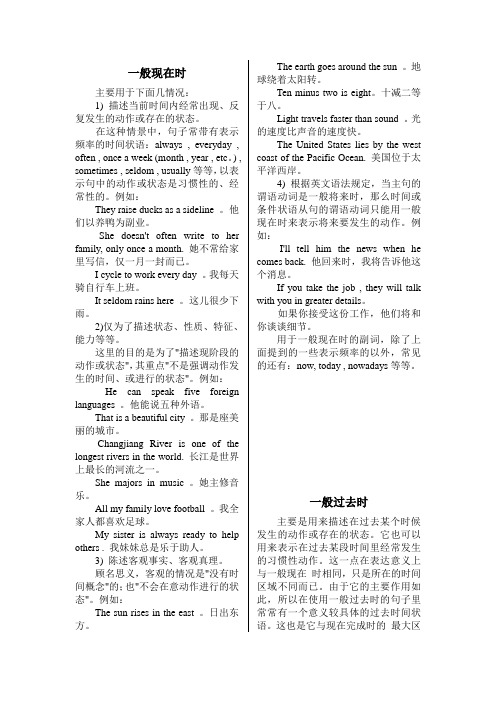
一般现在时主要用于下面几情况:1) 描述当前时间内经常出现、反复发生的动作或存在的状态。
在这种情景中,句子常带有表示频率的时间状语:always , everyday , often , once a week (month , year , etc。
) , sometimes , seldom , usually等等,以表示句中的动作或状态是习惯性的、经常性的。
例如:They raise ducks as a sideline 。
他们以养鸭为副业。
She doesn't often write to her family, only once a month. 她不常给家里写信,仅一月一封而已。
I cycle to work every day 。
我每天骑自行车上班。
It seldom rains here 。
这儿很少下雨。
2)仅为了描述状态、性质、特征、能力等等。
这里的目的是为了"描述现阶段的动作或状态",其重点"不是强调动作发生的时间、或进行的状态"。
例如:He can speak five foreign languages 。
他能说五种外语。
That is a beautiful city 。
那是座美丽的城市。
Changjiang River is one of the longest rivers in the world. 长江是世界上最长的河流之一。
She majors in music 。
她主修音乐。
All my family love football 。
我全家人都喜欢足球。
My sister is always ready to help others . 我妹妹总是乐于助人。
3) 陈述客观事实、客观真理。
顾名思义,客观的情况是"没有时间概念"的;也"不会在意动作进行的状态"。
例如:The sun rises in the east 。
2012中考英语语法常考点归纳整理
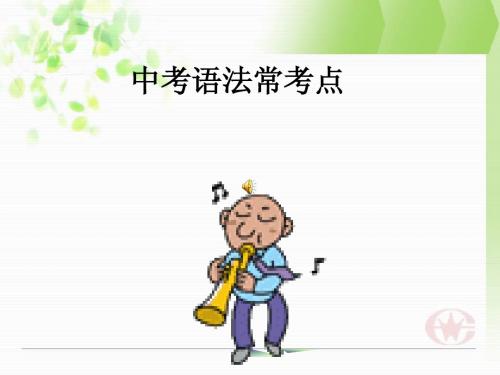
单项选择题的高频考点
1.代词 代词 2. 介词 3. 连词(and,so,but,or)/ 祈使句 连词( , , , ) 祈使句+and, or 4. 情态动词 5. 特殊疑问词(what,when,where,how 特殊疑问词( , , , many, how much, how often, who ) 6. 形容词,副词的比较级和最高级 形容词, 7. 动词的时态和语态 8. 宾语从句的语序问题 9. 时间状语从句和条件从句的主将从现问题 10. There be 句型
Summary:
Can 表示能力、允许 意为“能,会,可以”; 表示能力、允许, 意为“ 可以” can't意为“不会,不能,不可以” 意为“ 意为 不会,不能,不可以” may表示允许、许可,意为“可以,也许,可能 表示允许、 表示允许 许可,意为“可以,也许, 的一般问句的回答, ”。对may的一般问句的回答,肯定回答一般是 的一般问句的回答 :Yes, please./ Certainly./ Sure等,否定回答一 等 般是: , 般是:No,you can't/mustn't. must 表示必须要做的事,意为“必须,应该”。 表示必须要做的事,意为“必须,应该” must一般问句的否定回答用 一般问句的否定回答用needn't或don't have 一般问句的否定回答用 或 to,而不用 而不用mustn't, mustn't意为“不可以,不能 意为“ 而不用 , 意为 不可以, 表禁止,不许可。 ”,表禁止,不许可。
Group four: I didn’t understand _____, so I raised my hand to ask him. A. what my teacher says B. what does my teacher say C. what my teacher said D. what did my teacher say ---It’s raining. Maybe we can go out when the rain stops. --- But do you know______? A. when the rain will stop B. when the rain stopped C. when will the rain stop D. when did the rain stop
2012中考英语知识点总结与习题(全)

2012中考英语知识点【知识梳理】I. 重点短语1. Sit down2. on duty3. in English4. have a seat5. at home6. look like7. look at8. have a look9. come on10. at work11. at school12. put on13. look after14. get up15. go shopping II. 重要句型1. help sb. do sth.2. What a bout…?3. Let‟s do sth.4. It‟s time to do sth.5. It‟s time for …6. What‟s…? It is…/ It‟s…7. Where is…? It‟s….8. How old are you? I‟m….9. What class are you in? I‟m in….10. Welcome to….11. What‟s …plus…? It‟s….12. I think…13. Who‟s this? This is….14. What can you see?I can see….15. There is (are ….16. What colour is it (are they? It‟s (They‟re…17. Whose …is this? It‟s….18. What time is it? It‟s….7. Goodbye! Bye!8. What‟s your name? My name is ….9. Here you are. This way, please.10. Who‟s o n duty today?11. Let‟s do.12. Let me see.【名师讲解】1. in/on在表示空间位置时,in表示在某个空间的范围以内,on表示在某一个物体的表面之上。
(21份打包)2012年中考英语语法考点知识汇编-14

2012年中考英语考点18形容词的比较级和最高级形容词的比较级和最高级3) 有几个形容词的比较级和最高级属于不规则变化。
原级比较级最高级good/well 好的better bestbad/ill 坏的worse worstmany/much 多的more mostlittle 少的less leastfar 远的further furthestfarther farthestold 老的older oldestelder eldest2. 形容词比较级的用法1)形容词的比较级可以单独使用:Be more careful next time. 下次小心点。
It was quieter outside. 外面安静点了。
It couldn’t be easier. 不能再容易了。
This car is more expensive. 这辆车比较贵。
Who is taller? 谁高一点?Which book is better? 哪本书更好?1. 形容词比较级和最高级的构成1)单音节词和少数双音节词的比较级和最高级的构成2) 多音节词和部分双音节词在其前面加more或most。
如:原级比较级最高级useful more useful most usefuldifficult more difficult most difficult delicious more delicious most delicious 2)也可以和than连用,表示两者相比,than后可以跟:a. 名词或代词(若为人称代词,在口语中多用宾格):He is older than me. 他年龄比我大。
Tokyo is bigger than New York. 东京比纽约大。
b. 动名词:Skiing is more exciting than skating. 滑雪比滑冰更刺激。
This is more interesting than sitting in an office. 这比坐办公室更有意思。
初中英语语法汇总(2012中考总复习)
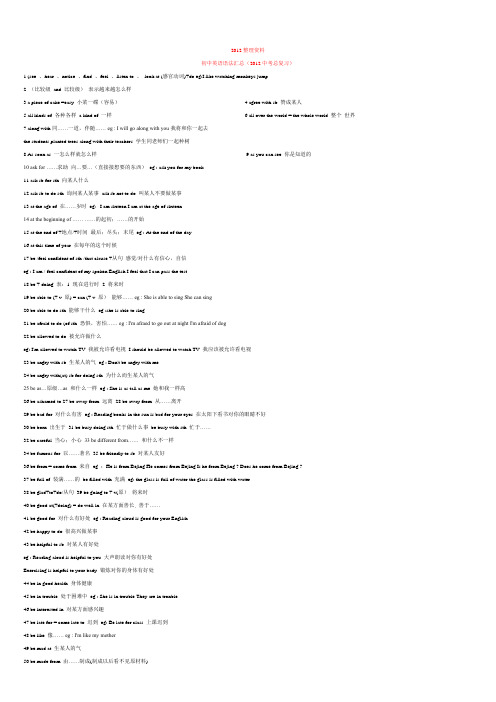
2012整理资料初中英语语法汇总(2012中考总复习)1 (see 、hear 、notice 、find 、feel 、listen to 、look at (感官动词)+do eg:I like watching monkeys jump2 (比较级and 比较级)表示越来越怎么样3 a piece of cake =easy 小菜一碟(容易)4 agree with sb 赞成某人5 all kinds of 各种各样a kind of 一样6 all over the world = the whole world 整个世界7 along with同……一道,伴随…… eg : I will go along with you我将和你一起去the students planted trees along with their teachers 学生同老师们一起种树8 As soon as 一怎么样就怎么样9 as you can see 你是知道的10 ask for ……求助向…要…(直接接想要的东西)eg : ask you for my book11 ask sb for sth 向某人什么12 ask sb to do sth 询问某人某事ask sb not to do 叫某人不要做某事13 at the age of 在……岁时eg:I am sixteen I am at the age of sixteen14 at the beginning of …… ……的起初;……的开始15 at the end of +地点/+时间最后;尽头;末尾eg : At the end of the day16 at this time of year 在每年的这个时候17 be /feel confident of sth /that clause +从句感觉/对什么有信心,自信eg : I am / feel confident of my spoken English I feel that I can pass the test18 be + doing 表:1 现在进行时2 将来时19 be able to (+ v 原) = can (+ v 原)能够…… eg : She is able to sing She can sing20 be able to do sth 能够干什么eg :she is able to sing21 be afraid to do (of sth 恐惧,害怕…… eg : I'm afraed to go out at night I'm afraid of dog22 be allowed to do 被允许做什么eg: I'm allowed to watch TV 我被允许看电视I should be allowed to watch TV 我应该被允许看电视23 be angry with sb 生某人的气eg : Don't be angry with me24 be angry with(at) sb for doing sth 为什么而生某人的气25 be as…原级…as 和什么一样eg : She is as tall as me 她和我一样高26 be ashamed to 27 be away from 远离28 be away from 从……离开29 be bad for 对什么有害eg : Reading books in the sun is bad for your eyes 在太阳下看书对你的眼睛不好30 be born 出生于31 be busy doing sth 忙于做什么事be busy with sth 忙于……32 be careful 当心;小心33 be different from…… 和什么不一样34 be famous for 以……著名35 be friendly to sb 对某人友好36 be from = come from 来自eg :He is from Bejing He comes from Bejing Is he from Bejing ? Does he come from Bejing ?37 be full of 装满……的be filled with 充满eg: the glass is full of water the glass is filled with water38 be glad+to+do/从句39 be going to + v(原)将来时40 be good at(+doing) = do well in 在某方面善长, 善于……41 be good for 对什么有好处eg : Reading aloud is good for your English42 be happy to do 很高兴做某事43 be helpful to sb 对某人有好处eg : Reading aloud is helpful to you 大声朗读对你有好处Exercising is helpful to your bady 锻炼对你的身体有好处44 be in good health 身体健康45 be in trouble 处于困难中eg : She is in trouble They are in tronble46 be interested in 对某方面感兴趣47 be late for = come late to 迟到eg: Be late for class 上课迟到48 be like 像…… eg : I'm like my mother49 be mad at 生某人的气50 be made from 由……制成(制成以后看不见原材料)51 be made of 由……制成(制成以后还看得见原材料) 52 be not sure 表不确定53 be on a visit to 参观54 be popular with sb 受某人欢迎55 be quiet 安静56 be short for 表**的缩写eg: 陶is short for 陶俊杰57 be sick in bed 生病在床58 be sorry to do sth be sorry for sb eg : I am sorry for you59 be sorry to hear that 60 be sorry to trouble sb eg : I am sorry to trouble you61 be strict in doing sth 严于做某事eg : He's strict in obeying noles62 be strict with sb 对某人要求严格eg: Some students are not strict with them selves 这些学生对自己不严格63 be strict with sb in sth 某方面对某人严格64 be supposed to do 被要求干什么65 be sure 表确定66 be sure of doing sth 对做某事有信心eg: He is sure of winning I am sure of learning English well67 be sure of sth 对做某事有信心eg: I'm sure of my head (my teacher 我相信我的大脑(老师)68 be sure that sth 对做某事有信心eg: I'm suer that he can pass the test 我相信他能通过考试69 be sure to do sth一定会做某事eg: We are sure to pass the test 我们一定会通过这次考试We are sure to learn English well 我们一定能学好英语70 be terrified of + 名/动doing 害怕…… 71 be terrified to do sth 害怕做某事72 be the same as … 和什么一样73 be used to doing sth 习惯做某事eg: My father is used to getting up early 我爸爸习惯早He is used to sleeping in class 他习惯上课睡觉74 be worth doing 值得做什么75 be(feel) afraid to do sth 害怕做某事be afraid of sth 害怕某物be afraid that 丛句76 because+句子because of +短语eg : He was late because he had a headache He was late because of his headache77 begin to do = start to do 开始做某事start…with…=begin…with… 以什么开始什么eg : Let's begin the game with the song I begin to go home78 between…and… 两者之间79 borrow sth from sb 向……借…… lend sth to sb ( lend sb sth 借给……什么东西eg : I borrowed a pen from him he lent a pen to me ( he lent me a pen80 both = the same(as) = not different(from) 表相同81 bother 打扰bother sb to do stheg : I'm sorry to bother you ,but can you tell me to way to the station我十分道歉打扰你,但是你能告诉我怎么去车站the problem has been bothering me for weeks 这个问题困扰了我几个周了He's bothering me to lend him money82 by the end of 到……为止83 call sb sth eg : We call him old wang84 care 关心eg : Don't you care about this country's future ?你为什么不关心国家的未来85 catch up with sb 赶上某人86 chat with sb 和某人闲谈take sb to + 地点带某人去某地87 come in 进88 come over to 过来89 come up with 提出eg: Can you come up with a good idea 你能想出一个好办法吗?90 communicate with sb 和某人交流91 consider + doing 考虑做什么eg : Why not consider going to lu zhou 为什么不考虑去泸州?92 dance to 随着……跳舞eg : She likes dancing to the music 她喜欢随着音乐跳舞93 decide to do sth 决定做某事94 do a survey of 做某方面的调查95 do better in 在……方面做得更好96 do wrong 做错97 Don't forget to do sth 不要忘了做某事98 Don't mind +doing /从句/名词不要介意……99 each +名(单)每一个…eg : Each student has many books 每一个学生都有一些书100 end up +doing 101 enjoy +doing喜欢102 escape from 从……逃跑eg: The prisoners have escaped from the prison犯人从监狱里逃跑出来103 expect to do sth 期待做某事104 fall down 摔下来fall off 从哪摔下来105 fall in love with sb /sth 爱上什么106 far from 离某地远eg : The school is far from my home 107 find +it +adj +to do 发现做某事怎么样108 find sb/sth +adj 发现什么怎么样eg : I find the book interesting 109 finish 完成+doing(名词)110 fit to sb = be fit for sb 适合某人111 forget to do 没有做而忘了forget doing 做了而又忘了eg: Don't forget to go home I forget closing door 112 from…to…从某某到某某eg: From me for her113 get /have sth down 做完,被(别人)做…eg: I have my hair cut 我理了发(头发被剪了)Tom got his bad tooth pulled out 汤母把他的坏牙拔掉了(被牙医拔掉了)114 get a part-time job= find a part-time job 115 get along well with sb = get on well with sb 与某人相处得好116 get along with sb = get on with sb 与某人相处117 get ready for = be ready for为什么而准备eg : I get ready for math I am ready for math 118 get sb in to trouble 给某人麻119 get sb to do sth 120 get…from… 从某处得到某物121 give a talk 做报告eg: He is give a tall122 give sth to sb give sb sth 给某人某物123 go fish 钓鱼go swimming 游泳124 go on to do 去做下一件事go on doing 继续做这件事125 go out away from go out of126 go to school 上学(用于专业的)go to the school 去学校(不一定是上学)127 good way to 好方法128 hate to do 讨厌没做过的事hate doing 讨厌做过的事129 have a party for sb 举办谁的晚会130 have a talk 听报告谈一谈131 have been doing 现在完成进行时eg : You have been talking You have been sleeping since132 have been to …( 地方)……去过某过地方have gone to …(地方)去了某地还没回来133 have fun +doing 玩得高兴134 have sth to do 有什么事要做eg: I have a lot of homework to do 我有很多家庭作业要做I have nothing to do 我没什么事情做135 have to do sth 必须做某事136 have trouble (problem) (in) doing sth 做什么事情有麻烦137 have…time +doing138 have…(时间)…off 放……假eg: I have month off 我请一个月得假139 hear sb +do/doing 听见某人做某事/正在做某事140 help a lot 很大用处141 help sb with sth \one's sth 帮助某人某事(某方面)help sb (to) do sth 帮助某人做某事142 hope to do sth 希望做某事143 How about(+doing) = What about(+doing)144 how do you like = what do you think of 你对什么的看法145 if : 是否=wethereg: I don't know if (wether) I should go to the party 我不知道我是否应该去参加晚会He don't know if (wether) we will arrive on time tomorrow morning 他不知道我们明天早上是否能准时到达146 if :如果,假如(全部接一般时态)+条件语态从句eg: I'll go to LuZhou if it does't rain 假如明天不下雨,我就去泸州If they change the plan they will let me know 假如他们要改变计划,他们会让我知道的I'll go to England ,if I have enough money next year 如果我明年由足够的钱,我就要去英国147 in one's opinion = sb think 某人认为148 in some ways 在某些方面149 in the end = finally(adv) 最后150 in the north of… 什么在什么的北方(north 北sowth 南west 西east 东)151 in the sun 在太阳下152 increase 增加eg : They've increased the prece of petrol by 3% 他们把石油价增加了3%the population has increased from 12 million ten years ago to 18 million now153 instead of +(名)代替eg: I'd like an apple instead of a pear 我想要苹果,而不要梨子I like English instead of math 我喜欢英语而不喜欢数学154 introduce sb to sb 介绍某人给某人introduce oneself 自我介绍155 invite sb to do sth 邀请某人做某事156 It takes sb sometime to do sth 做某人花掉某人多少时间eg : It took me 5 minutes to do my homework It takes me half an hour to cook157 It's +adj +for sb to do sth 对某人来说做某事怎么样158 It's +adj +to do 做某事怎么样159 It's +adj for sb 对于某人来说怎么样It's +adj of sb 对某人来说太怎么样160 It's +adj(for sb) to do(对某人来说)做某事怎么样It's +adj of sb to do sth 对某人来说做某事太怎么样eg : It's nice of you to help me with my English161 It's a good idea for sb to do sth 对…… 来说是个好主意162 It's important to sb 对某人来说很重要eg: It's important to me163 It's time to do sth It's time for sth 到了该去做某事的时间eg : It's time to have class It's time for class 该去上课了164 join = take part in 参加165 just now 刚才166 keep +sb /sth +adj /介词短语让什么保持什么样?167 keep out 不让…… 进入168 keep sb adj 让……保持…… eg: I want to keep my mother happy keep healthy 保持健康169 key to +名词表示:某物的钥匙或某题的答案170 key to… anser to … key 可以是答题或钥匙171 laugh at… 取笑…… e g : Don't langh at others We langhed at the joke172 learn by oneslfe 自学173 learn from sb 向某人学习eg: We should learn from Lei Feng174 learn to do sth 学做某事175 let sb do sth 让某人做某事176 Let sb down 让某人失望eg :We shouldn't let our farents down 我们不应该让我们的父母失望177 live from :离某地远178 live in +大地方/at +小地方居住在某地eg: I live in LuZhou She lives at XuanTan179 look after = take care of 照顾照看180 lose one's way 谁迷路eg : Lose your way 你迷路181 make a decision to do sth 决定做某事182 make friends with sb 和谁成为朋友eg : I want to make friends with you183 make it early 把时间定的早一点184 make on exhibition of oneself 让某人出洋相185 make sb /n +n 使什么成为什么eg : I made her my step moller I made you my wife186 make sb /sth +adj 使某人(某物)怎么样eg : You must made your bed clean187 make sb /sth adj 使某人/某物怎么样188 make sb do sth 让某人做某事eg : I made him write 我以前让他写189 make up be made up of (被动语态)由……组成190 make…difference to…191 mind sb to do mind one's doing 介意……做什么192 most +名most of +代193 much too +形容词194 must be 一定195 need +名词196 need sb do sth 需要某人做某事197 need to do (实义动词)need do (情态动词)198 no /neithr of hate to do no /neithr of hate doing199 no +名词200 not anymore = no more 再也不…… eg: He didn't cry any more He cried no more 他再也不哭201 not… (形、副)at all eg: He's not tall at all she doesn't junp far at all 202 not…at all 一点都不203 not…either 表否定,也不eg : I don't japanse either I don't have sister, either 我也没有姐姐204 not…until 直到……才……eg: I didn't sleep until my mother came back The child didn't stop crying until I give her sugar205 offer / provide sb with sth 给某人提供206 offer sb sth ( offer sth to sb 提供什么东西给某人eg : I offer you water (I offer water to you 我给你提供水207 on one's way to… 在谁去那的路上208 on the one hand 一方面on the other hand 另一方面209 on the phone = over the phone 用电话交谈210 on time 准时in time 及时211 one day =some day =someday 一天,有一天212 one of +可数名词的复数形式213 one to another 一个到另一个214 over and over agin 一遍又一遍的eg : He cleaned the floor over and over agin215 part-time job 兼职工作fall-time job 全职工作216 p ay for… 付……钱pay the bill 开钱,付钱217 please +do218 please help yourself219 pleased with sb220 pool into = pore into221 practice +doing 练习做某事222 prefer sth to sth 相对……更喜欢…… eg : I prefer physics to chemisty 在物理和化学中,我更喜欢物理prefer doing to sth 更喜欢去做…不愿意去做… eg: He prefers riding a bike to diving 他更喜欢骑自行车,不开小车prefer to do sth rather than do sth 宁愿做…也不愿eg: My unde prefers to buy a now car rather than repaiv the used one 我叔叔更喜欢买新的车,也不去修旧车prefer sb not to do sth 更愿意… eg: I prefer her not to come 我不喜欢她不来223 pretend to do sth 装着去做什么pretend that 从句eg : The two cheats pretended to be working very hard 这两个骗子装着努力工作He pretended that he did not know the answer 他装着不知道答案224 rather…than 宁可……也不……eg : I would rather be a doctor than a teacher 我愿肯当医生,也不当老师He likes dogs rather than cats 他喜欢狗,不喜欢猫225 regard…as 把……当作……eg: Please give my best regards to your family 请带我向你的家人我最好的问候I regard you as my friend 我把你当作我的朋友He shows little regard for others 他不爱关心别人226 remid sb about sth 提醒某人什么事remid sb to do sth 提醒某人做某事eg : he remids me about cooking (he remids me to cook 他提醒我做饭227 remid sb of sth 使某人想起什么eg : the pictures remind me of my school days 这照片使我想起了我的学校the words that (which) the teacher talke to remind me of my mother228 return sth to sb 还什么东西给某人229 say to oneself 对自己说230 say to sb 对某人说231 sb spend somemoney on sth 花了多少钱在某事上232 sb spend sometime with sb 花了多少时间陪谁233 sb spend sometime(in) doing sth 花了多少时间做某事234 sb with sb +is sb and sb +are235 see sb do 看见某人做过某事see sb doing 看见某人正在做某事236 seem to do/be +adj 显得怎么样eg : You seem to be tired You seem to be happy237 send +sb sth 送给某人某物238 send…to…把什么寄到哪里去?239 shock 使……震惊eg : Oh , It's only you ! You give me a shock 啊,是你呀!吓我一跳240 show sb sth 向某人展示某物eg : I show her the book.241 show sb sth = show sth to sb 拿什么东西给某人看eg: Show me your pen Show your pen to me242 show sth to sb 向某人展示某物eg : I show the book to her.243 some…others… 一些……另一些……244 start…with… 从……开始begin…with… 从……开始245 stay away from 远离……eg : We're told to stay away from the animals whe visiting the zoo 当我们参观zoo 时,我们要远离动物If you want to lose weight you'd better stay auay from the sweet food 徒工你想减肥,你最好远离甜食246 stop doing 停下正在做的事247 stop sb from doing sth 阻止某人做某事248 stop sb(from) doing 阻止某人做某事249 stop to do 停下正在做的事去做下一件事250 such +名这样,这种251 suit sb 适合某人252 surprise sb 使某人惊奇to one's surprise 令某人惊奇253 take classes 上课254 take sb to 把某人带去eg : I take you to the hospital255 take walks = take a walk =go for a walk 散步256 ①talk to 对谁说eg : I talk to you ② talk with 和谁说eg : I talk with him③ talk of 谈到eg : we talked of you ④ talk about 谈论关于……257 talk with sb 和某人说话258 teach sb sth 教某人做某事259 tell sb do sth 告诉某人做某事260 tell sb sth tell sb that 丛句tell sb not to do sth tell a story261 tell sb sth 告诉某人某事262 tell sb to do sth 告诉某人做什么tell sb not to do sth 告诉某人不要做什么263 tell…from…264 thank you for +doing265 the same +名词(doing)+as……266 the same…(名)…as as…(adj adv)…as 相同267 the way to do sth =the way of doing st做某方面的方法the way to +地方去哪的路e g :Do you know the way to learn English Do you know the way of learning English268 the way to…(地点)到哪的269 too…to… 太怎样而不能……adj +enough to 足够…能… so…that +丛句eg: He is too young to go to school = He is so young that he can't go to schoolHe is old enough to go to school =He is so old that he can go to school270 transalte ……into…… 把什么翻译成什么eg : Trasalte English into chinese271 travel with sb和某人去旅游272 try one's best to do sth尽某人最大的努力去做某事eg: I will try my best to learn English well 273 try to do sth 想干什么,但没成功try doing sth 想干什么,已经做过了eg :He tried to climb 他想爬上去,但没成功He tried climbing 他想爬上去,已经做过了274 try…试衣服have a try 试一下275 turn down 开小←→ turn up 开大276 turn off 关上←→ turn on 打开open 拆开277 upside down 倒着278 visit to… 参观某个地方279 wait for sb 等某人注:版权归时代精英所有所有,未经同意擅自转载!。
2012中考英语知识点整理
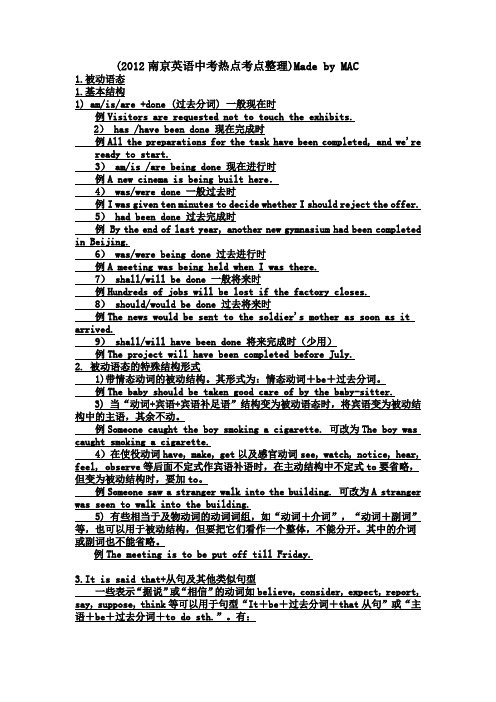
(2012南京英语中考热点考点整理)Made by MAC1.被动语态1.基本结构1) am/is/are +done (过去分词) 一般现在时例Visitors are requested not to touch the exhibits.2) has /have been done 现在完成时例All the preparations for the task have been completed, and we're ready to start.3) am/is /are being done 现在进行时例A new cinema is being built here.4) was/were done 一般过去时例I was given ten minutes to decide whether I should reject the offer.5) had been done 过去完成时例 By the end of last year, another new gymnasium had been completed in Beijing.6) was/were being done 过去进行时例A meeting was being held when I was there.7) shall/will be done 一般将来时例Hundreds of jobs will be lost if the factory closes.8) should/would be done 过去将来时例The news would be sent to the soldier's mother as soon as it arrived.9) shall/will have been done 将来完成时(少用)例The project will have been completed before July.2. 被动语态的特殊结构形式1)带情态动词的被动结构。
(21份打包)2012年中考英语语法考点知识汇编-11
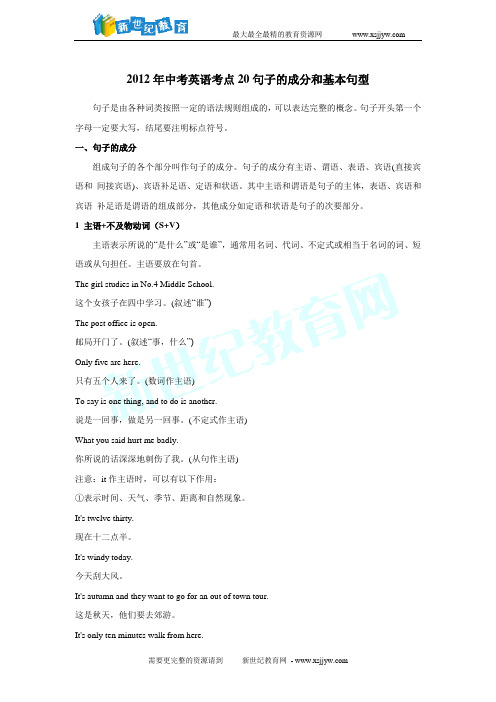
2012年中考英语考点20句子的成分和基本句型句子是由各种词类按照一定的语法规则组成的,可以表达完整的概念。
句子开头第一个字母一定要大写,结尾要注明标点符号。
一、句子的成分组成句子的各个部分叫作句子的成分。
句子的成分有主语、谓语、表语、宾语(直接宾语和间接宾语)、宾语补足语、定语和状语。
其中主语和谓语是句子的主体,表语、宾语和宾语补足语是谓语的组成部分,其他成分如定语和状语是句子的次要部分。
1 主语+不及物动词(S+V)主语表示所说的“是什么”或“是谁”,通常用名词、代词、不定式或相当于名词的词、短语或从句担任。
主语要放在句首。
The girl studies in No.4 Middle School.这个女孩子在四中学习。
(叙述“谁”)The post office is open.邮局开门了。
(叙述“事,什么”)Only five are here.只有五个人来了。
(数词作主语)To say is one thing, and to do is another.说是一回事,做是另一回事。
(不定式作主语)What you said hurt me badly.你所说的话深深地刺伤了我。
(从句作主语)注意:it作主语时,可以有以下作用:①表示时间、天气、季节、距离和自然现象。
It's twelve thirty.现在十二点半。
It's windy today.今天刮大风。
It's autumn and they want to go for an out of town tour.这是秋天,他们要去郊游。
It's only ten minutes walk from here.从这儿走十分钟就到了。
It was so hot in this summer.今年夏天可真热!②表示刚刚提到的事情。
What's this? It's a fox.这是什么? 它是一只狐狸。
2012年中考英语语法笔记大全练习讲解

(2)有些不可数名词用复数代指具体的事物
eg. hope ---hopes希望hardship --- hardships艰苦
(3)物质名词在表示数量时,常用某个量词+of来表示
eg. a cup of tea, seven pieces of bread, several bags of rice, …
A. Frenchmen, Germans B. Germans ,Frenchmans
C. Frenchmans , Germen D. Germen , Frenchmen
解析: Frenchman是复合词,其复数形式为Frenchmen; German的复数为直接在单词末尾+S,应选A.
13.The team ________ having a meeting .
5. Help yourself to __________.
A. chickens and apples B. chickens and apple
C. chicken and apple D. chicken and apples
解析: chicken可用作可数名词指小鸡,用作不可数名词指鸡肉,根据词题意应理解为鸡肉;apple为可数名词,故应+s,因此选D。
A. is B. are C. am D. be
解析: team是一个集合名词,即可表示复数意义(指整个小组) ,也可指小组中的成员(表示复数),此题意为后者,因此选B。
14. “Would you like _________?” “________, please.”
A. drink, Three coffees B. a cup of drink, Coffees
(21份打包)2012年中考英语语法考点知识汇编-4
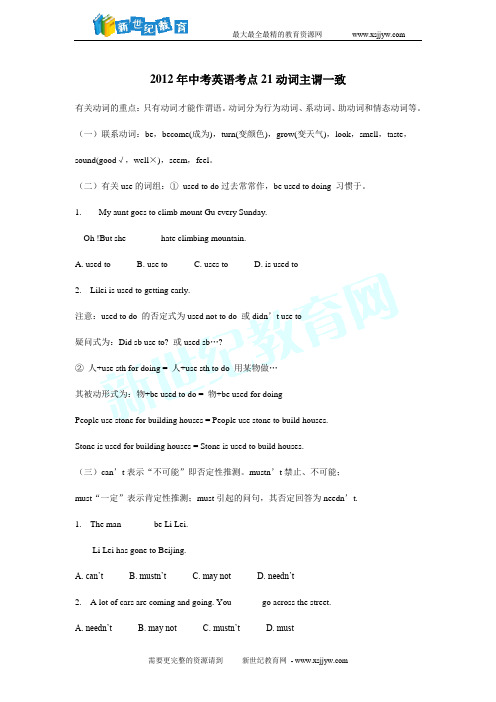
2012年中考英语考点21动词主谓一致有关动词的重点:只有动词才能作谓语。
动词分为行为动词、系动词、助动词和情态动词等。
(一)联系动词:be,become(成为),turn(变颜色),grow(变天气),look,smell,taste,sound(good√,well×),seem,feel。
(二)有关use的词组:①used to do过去常常作,be used to doing 习惯于。
1. ---My aunt goes to climb mount Gu every Sunday.---Oh !But she________hate climbing mountain.A. used toB. use toC. uses toD. is used to2. Lilei is used to getting early.注意:used to do 的否定式为used not to do 或didn’t use to疑问式为:Did sb use to? 或used sb…?②人+use sth for doing = 人+use sth to do 用某物做…其被动形式为:物+be used to do = 物+be used for doingPeople use stone for building houses = People use stone to build houses.Stone is used for building houses = Stone is used to build houses.(三)can’t表示“不可能”即否定性推测。
mustn’t禁止、不可能;must“一定”表示肯定性推测;must引起的问句,其否定回答为needn’t.1. The man _______be Li Lei.Li Lei has gone to Beijing.A. can’tB. mustn’tC. may notD. needn’t2. A lot of cars are coming and going. You_______go across the street.A. needn’tB. may notC. mustn’tD. must3. Must I return the book tomorrow morning? No, you_______. You_______keep it for three days.A. mustn’t, mayB. mustn’t, mustC. needn’t, canD. needn’t, may4. ---Look! The man at the gate _______be our headmaster. He is always standing there every morning. ---No, it be him. He is holding a meeting in the office now.A. must, can’tB. must, mustn’tC. can, can’tD. can, mustn’t(四)及物动词与介词搭配:give, show, pass, lend+物+to+ sb = give(…)sb sthmake, sing, buy+物+for+ sb = make(sing, buy)sb sth(五)及物动词+副词结构, 构成的动词短语的宾语是人称代词时,把代词放中间get (it) back,put (it) on,take (it) off,turn (it) on,pick (it) up,try (it) on,look (it) up,wake (me) up,put (it) up.1. Smoking is bad for your health. You’d better_______.A. give up itB. give it upC. take out itD. take it out基础知识:情态动词(一)can:①表能力“能,会”;②表推测“可能”;③表允许“可以”。
(21份打包)2012年中考英语语法考点知识汇编-2
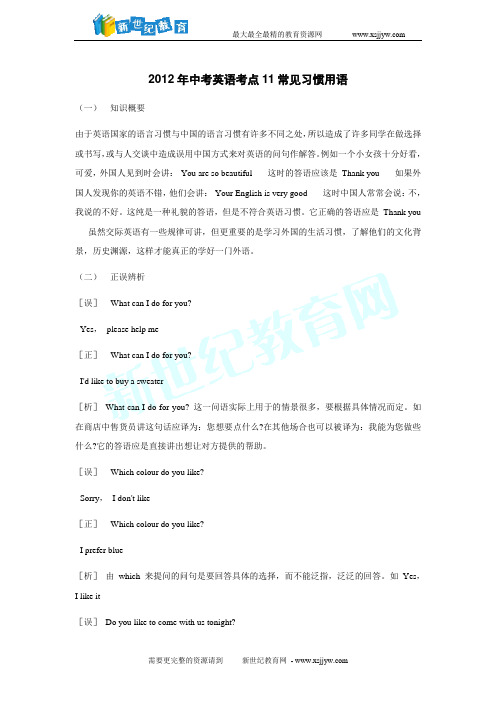
2012年中考英语考点11常见习惯用语(一)知识概要由于英语国家的语言习惯与中国的语言习惯有许多不同之处,所以造成了许多同学在做选择或书写,或与人交谈中造成误用中国方式来对英语的问句作解答。
例如一个小女孩十分好看,可爱,外国人见到时会讲:You are so beautiful这时的答语应该是Thank you如果外国人发现你的英语不错,他们会讲:Your English is very good这时中国人常常会说:不,我说的不好。
这纯是一种礼貌的答语,但是不符合英语习惯。
它正确的答语应是Thank you 虽然交际英语有一些规律可讲,但更重要的是学习外国的生活习惯,了解他们的文化背(二)正误辨析[误]- What can I do for you?- Yes,please help me[正]- What can I do for you?- I'd like to buy a sweater[析]What can I do for you? 这一问语实际上用于的情景很多,要根据具体情况而定。
如在商店中售货员讲这句话应译为:您想要点什么?在其他场合也可以被译为:我能为您做些什么?[误]- Which colour do you like?- Sorry,I don't like[正]- Which colour do you like?- I prefer blue[析]由which 来提问的问句是要回答具体的选择,而不能泛指,泛泛的回答。
如Yes,I like it[误]Do you like to come with us tonight?[正]Would you like to come with us tonight?[析]Do you like …问的是对方的习惯,如:Do you like swimming? Do you like collecting stamps? 而would you like …则是一次性的邀请、提议。
2012年中考英语语法考点知识复习8
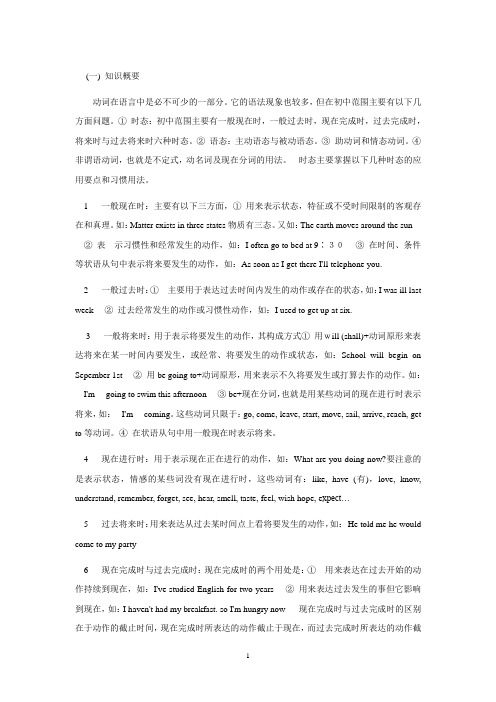
一) 知识概要动词在语言中是必不可少的一部分。
它的语法现象也较多,但在初中范围主要有以下几方面问题。
①时态:初中范围主要有一般现在时,一般过去时,现在完成时,过去完成时,将来时与过去将来时六种时态。
②语态:主动语态与被动语态。
③助动词和情态动词。
④非谓语动词,也就是不定式,动名词及现在分词的用法。
时态主要掌握以下几种时态的应用要点和习惯用法。
一般现在时:主要有以下三方面,①用来表示状态,特征或不受时间限制的客观存在和真理。
如:Matter exists in three states物质有三态。
又如:②表示习惯性和经常发生的动作,如:I often go to bed at 9∶30③在时间、条件等状语从句中表示将来要发生的动作,如:As soon as I get there I'll telephone you.一般过去时:①主要用于表达过去时间内发生的动作或存在的状态,如:I was ill last②过去经常发生的动作或习惯性动作,如:I used to get up at six.一般将来时:用于表示将要发生的动作,其构成方式①用will (shall)+动词原形来表达将来在某一时间内要发生,或经常、将要发生的动作或状态,如:School will begin on②用be going to+动词原形,用来表示不久将要发生或打算去作的动作。
如:③ be+现在分词,也就是用某些动词的现在进行时表示将来,如:。
这些动词只限于:go, come, leave, start, move, sail, arrive, reach, get to等动词。
④在状语从句中用一般现在时表示将来。
现在进行时:用于表示现在正在进行的动作,如:What are you doing now?要注意的是表示状态,情感的某些词没有现在进行时,这些动词有:like, have (有),love, know, understand, remember, forget, see, hear, smell, taste, feel, wish hope, e xpect…过去将来时:用来表达从过去某时间点上看将要发生的动作,如:He told me he would现在完成时与过去完成时:现在完成时的两个用处是:①用来表达在过去开始的动作持续到现在,如:②用来表达过去发生的事但它影响到现在,如:现在完成时与过去完成时的区别在于动作的截止时间,现在完成时所表达的动作截止于现在,而过去完成时所表达的动作截止于过去。
(完整版)2012年中考英语语法总复习之时态总结(完整),推荐文档
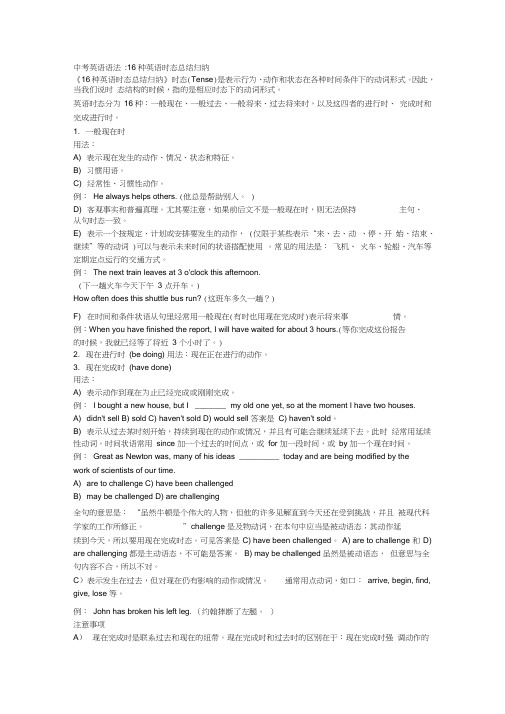
中考英语语法:16 种英语时态总结归纳《16 种英语时态总结归纳》时态(Tense)是表示行为、动作和状态在各种时间条件下的动词形式。
因此,当我们说时态结构的时候,指的是相应时态下的动词形式。
英语时态分为16 种:一般现在、一般过去、一般将来、过去将来时,以及这四者的进行时、完成时和完成进行时。
1. 一般现在时用法:A) 表示现在发生的动作、情况、状态和特征。
B) 习惯用语。
C) 经常性、习惯性动作。
例:He always helps others. (他总是帮助别人。
)D) 客观事实和普遍真理。
尤其要注意,如果前后文不是一般现在时,则无法保持主句、从句时态一致。
E) 表示一个按规定、计划或安排要发生的动作, (仅限于某些表示“来、去、动、停、开始、结束、继续”等的动词 )可以与表示未来时间的状语搭配使用。
常见的用法是:飞机、火车、轮船、汽车等定期定点运行的交通方式。
例:The next train leaves at 3 o'clock this afternoon.(下一趟火车今天下午 3 点开车。
)How often does this shuttle bus run? (这班车多久一趟?)F) 在时间和条件状语从句里经常用一般现在(有时也用现在完成时)表示将来事情。
例:When you have finished the report, I will have waited for about 3 hours.(等你完成这份报告的时候,我就已经等了将近 3 个小时了。
)2. 现在进行时(be doing) 用法:现在正在进行的动作。
3. 现在完成时(have done)用法:A) 表示动作到现在为止已经完成或刚刚完成。
例:I bought a new house, but I _______ my old one yet, so at the moment I have two houses.A) didn't sell B) sold C) haven't sold D) would sell 答案是C) haven't sold。
2012届中考英语考点备考复习7

2012届中考英语考点备考复习71470 trusers(n)裤子I as still in shrt trusers at the tie我那时还穿着短裤呢。
(仍然是个男孩)He re a pair f bla trusers他穿着一条黑色裤子。
The t pairs f trusers are ine这两条裤子是我的。
1471 tru(n)货车, 卡车He drives a tru他开卡车。
1472 true(a)真实的, 真正的, 忠实的The nvel is based n a true str这部小说是根据这实得故事写成的。
It as true lve beteen the他们是真心相爱。
He’s a true gentlean他是个正人君子。
She’s nt the true ner f this huse她不是这所房子的真正所有人。
* trul (ad) 真正地,真实地1473 trust(v)相信, 信任an the be trusted t tae are f the business hile e are aa?我们外出期间能托他们照顾生意吗?u an trust e nt t tell anne你可以相信我不会跟任何人讲。
Dn’t trust hat the nespapers sa别相信报纸上的话。
1474 truth(n)事实真相, 真理, 真实性D u thin she’s telling the truth?你认为她在讲实话吗?147 tr(v)试图;努力[+t-v]e’ll tr t iprve ur teahing ethds我们要设法改进教学方法尝试,试行[+v-ing]Let’s tr ning at the ba dr咱们敲后边的门试试。
1476 T- shirt (n)T恤, 短袖汗衫1477 Tuesda(n)星期二1478 turn (n, v)【动词】转动,转身,(道路,河流)转向,转弯,变成,成为He turned the e in the l他转动钥匙开锁。
- 1、下载文档前请自行甄别文档内容的完整性,平台不提供额外的编辑、内容补充、找答案等附加服务。
- 2、"仅部分预览"的文档,不可在线预览部分如存在完整性等问题,可反馈申请退款(可完整预览的文档不适用该条件!)。
- 3、如文档侵犯您的权益,请联系客服反馈,我们会尽快为您处理(人工客服工作时间:9:00-18:30)。
2012年中考英语考点知识13非谓语动词(一)非谓语动词就是在句子中不充当谓语的动词。
它不受主语的限制,也没有像谓语动词那样的时态和语态的变化,又称为非限定动词,在句子中可以作主语、宾语、表语、宾补、定语和状语。
非谓语动词包括三种形式:不定式、动名词和分词。
动词不定式动词不定式的基本形式为:to+动词原形,有时可不带to。
不定式的否定形式是not to+动词原形。
动词不定式仍然具有动词的功能,可以接宾语或状语而构成不定式短语。
例如:to beat the opponent 打败对手to put on your coat 穿上你的大衣to drive fast 快速驾车to return home 归国,回家注意:不定式之前的to(又称为小品词)与介词to功能不同。
介词to 之后要接名词或代词的宾格,或相当于名词的短语作它的宾语。
而不定式的小品词to的后面需要跟原形动词。
speak to him (to是介词)对他讲话to speak English (to是不定式的小品词)讲英语1 不定式在句子中的用法(1)不定式作名词的用法不定式起名词作用,在句子中可以充当主语、表语、宾语和宾语补足语。
①不定式作主语To grow more trees here is very important.(=It is very important to grow more trees here.)在这里多种些树是非常重要的。
To think carefully before you act is necessary.(=It is necessary for you to think carefully before you act.)你须三思而后行。
To walk to school takes me twenty minutes.(=It takes me twenty minutes to walk to school.)步行到学校我要花20多分钟。
注意:在It is...to的句型中,It是形式主语,真正的主语是不定式;这种结构,避免了句子的头重脚轻。
通常不定式被视为单数第三人称,所以动词用is或was。
It's bad for your eyes to read in the sun.在阳光下看书对你的眼睛有害。
另外,不定式作主语的句子,同时有另外一个不定式作表语时,不能转换成“It is...to...”的句型。
例如:To see is to believe. (百闻不如一见。
)不能转换为:It is to believe to see.不定式作主语不定式,作主语,有一点,应注意,短语长,往后移,其位置,it 替。
②不定式作表语Her dream is to be a lawyer.她的梦想就是成为一名律师。
What they want is to do it at once.他们所要求的就是立刻着手做这件事。
③不定式作宾语不定式作宾语是用在及物动词之后。
常用的及物动词有:want, wish, hope, like, begin, start, help, agree, refuse, promise, learn, forget, know, need, try等。
She wanted to get home earlier that day.她那天想要早一些到家。
They refused to do so.他们拒绝那样做。
巧记接不定式作宾语的动词Hope、wish、want、agree、promise、Demand、ask、refuse、Manage、learn 、decide、Pretend、choose 三个希望两答应; 设法学会做决定不要假装在选择④不定式作宾语补足语要求用不定式作宾语补足语的动词很多,例如:ask, want, believe, know, tell, advice , like, feel, help, force, invite, let, have, make, prefer, notice, order, remind, see, teach, think, expect, enable,cause, choose, allow, persuade等。
She adviced him to do so.她劝他这么做。
The doctor told me not to go on with the work.医生告诉我不要再继续做这件工作了。
He reminded me to lock the door when I Left.他提醒我离开时锁上门。
注意:1、表示感官的动词如see, hear, watch, feel, notice和某些使役动词如let, make, have等,其后作宾语补足语的不定式通常不带to。
例如:It made me feel thirsty.这东西让我感到口渴。
2、动词help之后,不定式带to或不带to都可以。
Will you please help me (to) take this suitcase?请你帮我提一下这个衣箱好吗?必背:下列结构必须使用不带to的动词不定式。
had better do...最好还是做……would you please do...请您做……would rather do...宁愿做……would sooner do...愿做……may just as well do...是做……的好rather than do...而不是做……例如:Susan preferred to stay at the dormitory rather than go out with them.苏姗宁可呆在宿舍里,也不跟他们出去。
As you are feeling hungry, you may just as well find something to eat.既然你觉得饿了,还是找些吃的东西吧。
You'd better take this way.你最好走这条路。
注意:在复合宾语中,可以用形式宾语it代替作直接宾语的不定式,而将不定式放在补足语的后面。
She found it difficult to change his mind.她发现要想改变他的思想很困难。
He considered it his duty to do so.他认为这样做是应该的。
The situation now makes it easy for them to finish building the bridge on time.目前的这种情况使他们很容易按时完成大桥的建设。
(2)不定式作形容词的用法--作定语不定式作定语修饰名词,要放在所修饰的名词之后(又称后置定语)。
这类名词经常使用的有:time, way, chance, right(权力),need(需要),decision(决定),opportunity(机会),effort(努力),courage(勇气),struggle(斗争)等。
例如:Mr. Wang is a man to believe in.王先生是一位值得信赖的人。
I think he is a man to depend on.我认为他是一个可以依赖的人。
Can you find anything to read at the dentist?在牙诊所你可以找到可阅读的东西吗?The boy found no one to play with.这孩子找不到人跟他一块玩。
(3)不定式作副词的用法--作状语。
①不定式可以在句子中作目的、原因和结果状语。
I am sorry to have bothered you.我非常抱歉打搅了你。
(原因状语)They will come to the city to look for a job.他们将要到大城市来找工作。
(目的状语)If you are so stupid as to do so, you must expect trouble.你如果愚蠢得这样做事,你就等着自找麻烦吧。
(结果状语)②“too...to...”结构中的不定式含有否定的意思,因此“too...to...”表示“太……而不能……”。
The boy is too young to join the army.这孩子太小,还不能参军。
He is too busy to see me.他太忙,不能来看我。
③“so as...+不定式”结构,不定式作目的状语,意思是“以便……”。
“so+形容词(副词)+as+不定式”结构,不定式作结果状语。
He went there quickly so as to meet her.他赶快到那里去以便可以碰见她。
(目的)He was so kind as to offer his seat to me.承他好意,把座位让给了我。
(结果)The man was so angry as to smash the things in the room.这个人气极了,便开始摔屋里的东西。
(结果)比较:不定式作宾语和作状语的区别。
1 She wants to sleep. (作宾语)她想去睡觉。
2 She went there to sleep. (作状语)她去那儿睡觉。
不定式sleep在上述两句话中分别作宾语和状语。
区分它们有两种方法:①及物动词之后的不定式为宾语(如上面第一句);不及物动词之后的不定式为状语(如上面第二句)。
②按句子含义理解,第一句中,缺少不定式to sleep(作宾语),句子便不完整(she wants),因此这里的不定式to sleep是不能缺的。
而例2中的to sleep(作状语)修饰动词went,表示去那里的目的(是睡觉)。
如果没有这个不定式to sleep,句子依然完整。
(4)不定式作插入语To tell you the truth, you'd better change your car.说实在话,你最好换换你这辆车。
To be fair, it's not his fault, he s not the one to blame.说句公道话,这不是他的错,不该责备他。
2 不定式的时态不定式经常使用的有三种时态形式:一般式,进行式和完成式。
(1)一般式(to do)通常表示与谓语动词所示动作同时或在其后发生的行为或动作。
She wanted to write a letter.她想写一封信。
She told him to put the things in the room in order.她让他把屋子里的东西收拾一下。
